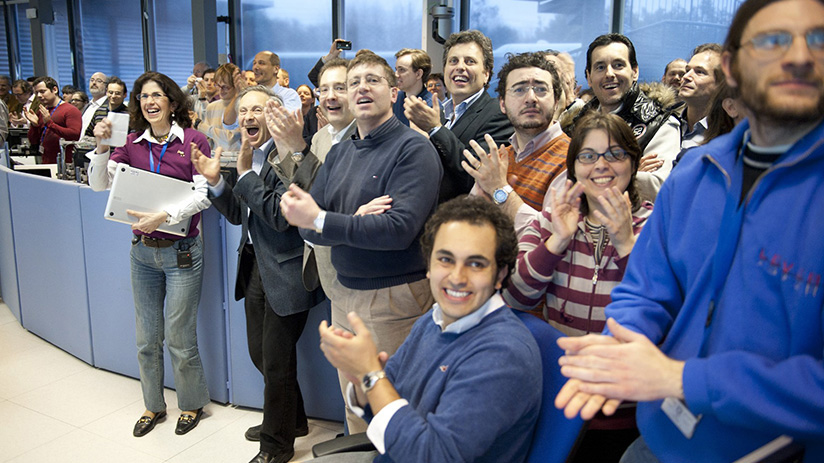Director: Mark Levinson,
Watched in: Theater,
Rating: 1.5/5.
Judging by the packed house at an opening night screening of the new documentary Particle Fever, the movie seems to have a sizable niche audience. Telling the story of the Large Hadron Collider, an immense and expensive science experiment going on in a vast underground bunker in Switzerland, the movie is certain to thrill physicists, scientists, astronomers, philosophy majors, math geeks, nerds, braniacs and other lovable eggheads who see vast mysteries and thrilling possibilities in dense, convoluted equations. If you’re like me, however, whose last encounter with arithmetic was 10th grade geometry, the movie is likely to induce restlessness, as if you’re back in that high school class impatient for the bell to ring.
Particle Fever tags along with several physicists working on the LHC, part of a vast international squadron of scientists teaming up to discover the origin of the universe. Their plan is to simulate the Big Bang within the Collider, crashing together atoms over and over again in order to break them apart and find evidence of the Higgs Boson. The Higgs is–if I followed this correctly–a sub-atomic particle that could potentially explain why we exist. Apparently this was a big deal last year when news broke of the discovery of the Higgs Boson, but what wasn’t such a big deal was that no one seems quite sure what to do with this knowledge. It’s a problem the documentary struggles with as well. After an engrossing, fast-paced and gently entertaining first thirty minutes during which the filmmakers manage to convey an aura of wonder and excitement, the movie gradually goes flat.
The LHC is shut down for several months due to an accident, so the time is filled with half-hearted forays into the personal backstories of a few of the physicists. These potentially interesting diversions tend to end up at the same place, with the scientists scribbling indecipherable calculations on blackboards. Many of the interviews in the film were conducted via Skype, never a visually flattering medium, and a good portion of the B-roll in the movie consists of hanging out with the characters in classrooms or offices or hovering over their shoulders while they tap away at their laptops. Except for one woman who we see running, biking and rowing, the majority of this group doesn’t get much exercise or sunshine. They prefer data, which leaves the film’s director, Mark Levinson, no choice but to try and visualize this data with animated light shows resembling a Led Zeppelin Laser Theater presentation. Later in the film, after the experiment gets going again, the physicists begin babbling in a kind of geeky jargon about a unit of measurement called a GEV, which stands for either “gigaelectronvolt” or “generalized extreme value distribution.” I looked both up on Wikipedia, since I’m not sure if the film defined it or not.
I’m always wary when a documentary is produced by one of its main characters, in this case physics Professor David Kaplan, who began documenting his involvement with the LHC back in 2008. He admits that scientists don’t like to talk too much about the metaphysical, big-picture implications of their experiments, which is exactly what this film lacks. It is too promotional and too insidery, ginned up with a manufactured, sports movie excitement, as if something really important is at stake. But the feeling Particle Fever left me with was something more like a colossal shrug rather than a big bang.

